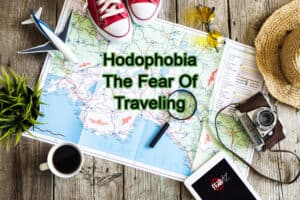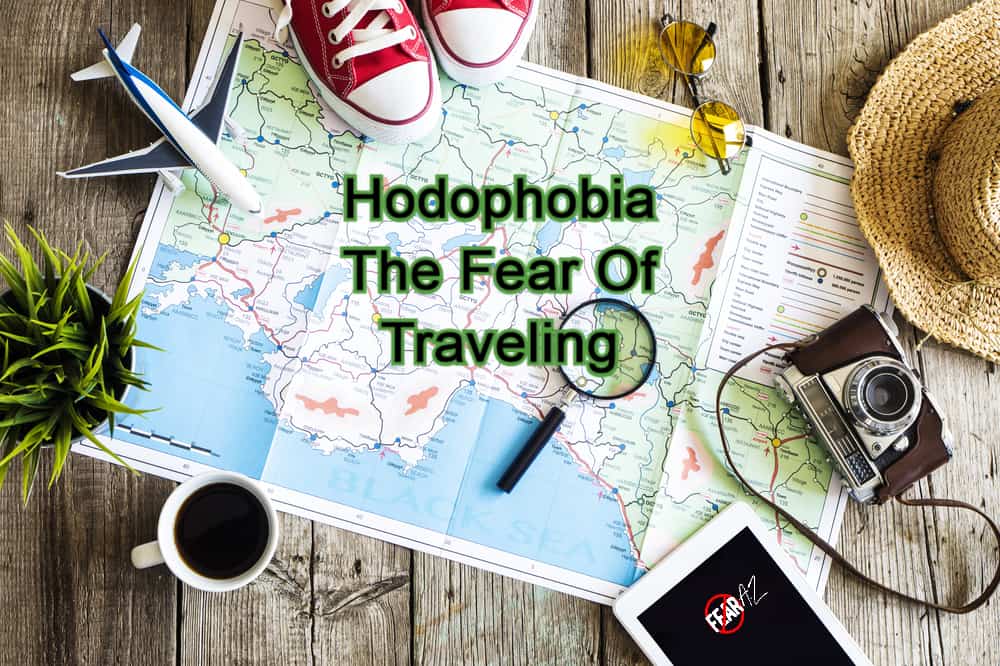Share This Article
Moving through the Fear of Traveling
Do thoughts of traveling fill you with dread? Do you break out in a cold sweat at the mere idea of going on vacation?
We all have a list of irrational fears, but if your fear interferes with your life to the point of major physical discomfort and avoidance of daily activities, it is a phobia.
If traveling makes you feel this way, you may be suffering from hodophobia, a fear of traveling phobia that can severely limit your life experiences.
The good news is hodophobia is treatable. The first step is finding out why you have this fear. By understanding the underlying causes of your hodophobia and using helpful techniques, you can learn to overcome this fear and reclaim your ability to travel freely.
What Is Hodophobia?
Hodophobia is a fear of traveling or going on a trip, which can cause anxiety and discomfort. People with hodophobia might feel scared or worried about leaving home or going to new places.
They might experience physical symptoms like a racing heart, sweating, or shaking, as well as mental or emotional symptoms like excessive worry or panic attacks.
Hodophobia can make it challenging for people to travel or go on trips, and it can limit their life experiences. However, there are treatment options available that can help individuals overcome their fears and enjoy new experiences.

What Causes Hodophobia?
Bad travel experiences can be a significant cause of hodophobia. Traumatic experiences such as accidents, illnesses, or injuries during a trip, may create a lasting impact on a person’s mind, leading to a fear of traveling again.
For instance, a person who experiences a severe bout of food poisoning while traveling may develop a fear of eating food from unknown places or countries.
Similarly, a person who at a young age faced an accident during a trip may learn to be afraid of traveling.
Fear of the unknown is another significant cause of hodophobia. The uncertainty of what might happen during travel can cause worry for some.
Health anxiety is also a common cause of hodophobia. People with health anxiety tend to worry excessively about becoming ill or injured while traveling. They may fear not having access to medical care or the familiarity of their own doctor, which may cause them to avoid traveling altogether.
Control issues are another cause of hodophobia. People with hodophobia may feel anxious about being in unfamiliar settings and not being able to control their environment, which can trigger their fear of travel.
Symptoms of Hodophobia
Physical Symptoms
- Racing heartbeat
- Nausea
- Sweating
- Shaking
Mental/Emotional Symptoms
- Excessive worry
- Irritability
- Panic attacks at the thought of a trip
Self-Help
There are many self-help techniques you can try.
Relaxation Techniques
Relaxation techniques practiced during travel are an important part of learning to cope with hodophobia. These techniques help you stay calm and promote deep breathing, meditation, and mindfulness. Progressive muscle relaxation can release tension and ease anxiety.
Challenging Your Irrational Thoughts
Try challenging any irrational thoughts about travel. Work to identify unrealistic worries and replace them with more positive thoughts.
Keep Your Senses Grounded
Make an effort to stay occupied on your trip with books, music, podcasts, games, or conversation. Keeping a positive, grounded mindset will keep you occupied and help decrease the fear.
Connect with Those around You
Connecting with other travelers can help you. Talk to people sitting near you on planes or trains, or join group tours at your destination. Sharing the experience with others can help you feel less afraid.
Be kind to yourself and remember that the discomfort is only temporary.
Professional Help
Cognitive Behavioral Therapy (CBT)
CBT is one of the most effective therapies for phobias and anxiety disorders. A CBT therapist can help you identify irrational thoughts about travel and reframe them in a more positive and realistic way.
Your therapist will provide structured exposure techniques to gradually help desensitize your fear response in a controlled manner. CBT can be especially helpful for hodophobia.
Eye Movement Desensitization and Reprocessing (EMDR)
EMDR is a therapeutic approach that uses eye movements or other sensors to help process traumatic memories and fearful associations. An EMDR therapist can help address any traumatic experiences related to travel that might be fueling your hodophobia. EMDR can be effective for phobias.
Medication
Your doctor may sometimes prescribe anti-anxiety medications or antidepressants to help manage severe hodophobia symptoms, especially when used in combination with therapy. Medication alone is usually not enough, but it can be a useful companion treatment for hodophobia.
Exploring Underlying Causes
A therapist is trained to determine any underlying issues contributing to your hodophobia, such as past trauma, panic disorder, social anxiety disorder, or obsessive thoughts. Addressing these underlying contributors will provide more lasting relief from symptoms.
Support
The support of a therapist can help keep you accountable for practicing exposure techniques and challenging fearful thoughts. A therapist can also provide encouragement and help you work through roadblocks or setbacks.
Celebrate small victories to stay motivated. Overcoming hodophobia may take conscious effort, but it is achievable.
How to Get Over the Fear of Traveling
Some key things to keep in mind:
Stay Optimistic
Try to maintain a positive and hopeful outlook. Remind yourself that the fear is temporary and will pass. Each trip you take will make the next one easier.
Prepare Well
Do research ahead of time to feel more in control and less anxious about what to expect. Familiarize yourself with routes, transportation details, times, and lodging. Feeling unprepared will increase worry.
Maintain a Sense of Control and Familiarity When Possible
Pick a mode of transportation that will increase your comfort and sense of control, such as self-driving, visiting familiar places, or sharing lodging. But try to step outside your comfort zone as well.
Challenge Fearful Thoughts
Notice worries and ask yourself if they are realistic or irrational. Try to reframe them in a more constructive way. Stay focused on enjoying experiences, not going into panic.
Take Care of Yourself
Make sure to eat healthy, limit alcohol and caffeine, get enough sleep, and take occasional breaks. Your physical state influences your mental state. Take good care of yourself before, during, and after trips.
Remember the Benefits of Overcoming Hodophobia
Traveling opens you up to new perspectives, adventures, memories, and life-expanding moments. Giving in to fear means missing out on experiences that can enrich your life.
Wrapping Up
While fear of unknown places is natural, hodophobia can limit your life experiences. Recognizing the signs and causes of your fear of travel is the first step. Then try self-help strategies or seek professional help from a therapist trained in anxiety disorders and phobias. With time and effort, you can defeat hodophobia, freeing you to embark on exciting journeys both near and far.



